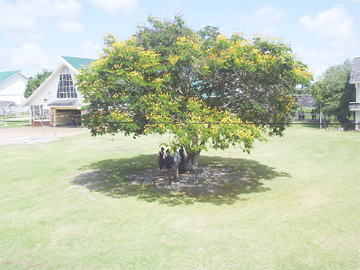One of the first things that many alumni do when they visit President’s College is head to the dining hall and grab some food. It is strange really, because many of them would have had some complaint about it when they lived at the secondary school.
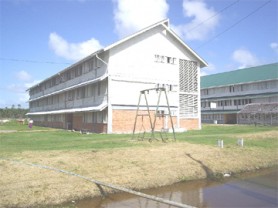
But something draws them back. Maybe it is the sense of familiarity and the knowledge that some things never change. Like the ubiquitous “rice-eaters” that roam the hallowed halls and cats that prowl in the night. Or the bust of the school’s founder, LFS Burnham, which sits in the administration building under the eternal watchful eyes of a giant portrait of the former President. The ‘School of Excellence’ was his vision and it has lived up to its name, producing top scholars on an annual basis.
Nestled amidst the backlands of Golden Grove on the East Coast Demerara, the live-in school, one of the country’s premier secondary schools, once grew its own rice, had its own fishponds, reared cattle, pigs and chickens. It has produced some of the country’s top athletes. But times change. Rice is grown no more and the fishponds have dried up. Shrubs and weeds cover the former fields. Cows, pigs and chickens are still being reared and some of the animals roam the compound as though it is their own personal pasture.
Like before, students from all parts of Guyana, still call the dormitories their home and here they re-learn the old tales of “Burnham and his headless horse” while studying Mathe-matics, English and Biology; screaming during blackouts and rebelling against fetching water.
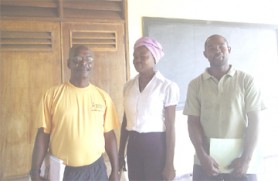
But some of the lustre is gone. Like the steel pans of the once formidable President’s College Steel Orchestra, which sit silently in a storeroom, the music that plays for the institution seems a little less sweet these days. Neglected is a word used by many to describe the school. The school’s well has outlived its usefulness and there are periods when there is no running water. At other times, students and staff have to struggle to fetch water because of the low pressure. However, some tanks have been placed at various locations; outside the dormitories, on little trestles and even one on the stairway that lead to the classrooms. Wood ants attack the buildings and leaking roofs allow the rain to enter. Classroom furniture is old and broken and some teachers have to do without. Equipment for the Science laboratories and the Home Economics Department is limited.
In response, the authorities have cited figures spent on the school and say that the expenditure of the school was $163 million in 2007, $168 million in 2008 and in 2009, $186 million. Education Minister Shaik Baksh says that to drill a new well would cost about $80 million to $90 million, which the administration does not have.
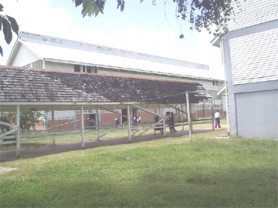
But the problems have been around for some time and the situation has worsened, said Garvin Blackman, a former student, who graduated in 2004 and returned to teach there in January. He listed limited equipment at the Science and Home Economics Departments as a few of the “many shortcomings” at the school.
“Students as much as we would do the theoretical aspect of Home Economics and Science, you still have the practical aspect to cover,” said Blackman, who teaches English Language, English Literature and Principles of Accounts. He noted that the limited facilities can lead to the practical aspect of the subjects not being done properly and teachers try to “visualize” the situation as best as they could for the students. Some of them have to do this without the benefit of a chair or a desk on which to sit, afterwards.
Some programmes like music and dance are no more. The purple and white steel pans, which once graced many functions, are locked away in a storeroom. They need to be tuned but this is costly and there is no music teacher.
These days too it is the buildings that are under attack. Rot and wood ants have begun to wreck wooden walls and roofs. And with regard to the playfield, Physical Education teacher Keith Smith says that most of the sports activities have to be held at the Enmore ground. Student athletes train on the roadsides with no proper equipment, he said while pointing out that the college still produces top athletes. A swing, once much-used, is broken.
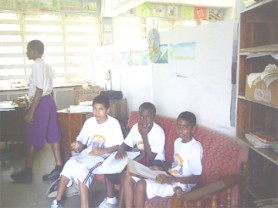
Despite all this, if there is anything that deserves to be highlighted, it is the unswerving dedication of the teachers and staff and the drive of the students. The results of the examinations tell one story but there are others untold and unseen. The teachers who bring their personal equipment so that students can do their work properly; free extra lessons; the comforting of a child crying in the night; and there are others, who resisted other opportunities and have been there for years. Like the diminutive Miss Alder, a teacher of Agricultural Science; the gregarious ‘house father’ Mr Forde and the tireless ‘mother’ to many, chemistry teacher and now Acting Principal Yvette Chichester.
Some former students, like the brothers Garfield and Garvin Blackman, return to “give back” and now teach there. There have been some improvements, like the new document centre, a project of the Parents Teachers Association (PTA). “We try to do good things here,” one teacher said. They agree that results at the Caribbean Secondary Examination Certificate (CSEC) exams have been exceptional. Last year the school chalked up 100% passes in 15 subjects at the CSEC exams and also in 24 subjects at the Caribbean Advanced Proficiency Examinations (CAPE). If the students can do well under these conditions, imagine what they can do under improved conditions, a teacher commented.
Mercylene Moses, who has been a guidance and counselling officer there since 2001 says that the state of the school is troubling but noted that with a new PTA, some things are progressing. She said though that there needs to be more activities for students. The counsellor pointed out that the playfield is covered in bush and while there is the basketball court, this is not enough. “A people without vision perish,” she quoted from the Bible. “This place really wants a facelift,” she added. “President’s College is a school of excellence and a school of excellence it should be and at present we are not treated as a school of excellence,” another says. It has produced many, who have gone on to excel in their fields. Like the youngest ever winner of the Guyana Prize for Literature, Ruel Johnson. Many things have changed and not always for the better.
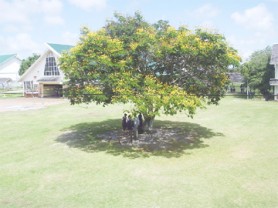
Some things, however, are timeless. Under the bright morning sun, students recite the school’s credo, sing the song, say the prayer and march off to classes. At nights, the lights from the college push away the surrounding darkness; a beacon that in every way, it still is.

